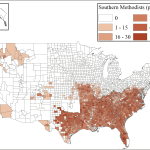It is possible that a generation of preachers may grow up relying on the great translation work of the ESV and other translations and preaching from the English Bible with infrequent reference even in preparation to the original languages? Would such a situation be less or more problematic for the church than people with the little knowledge that is often described as a dangerous thing attempting to revise Bible translations themselves? How important is it in your view for every preacher to learn the original Greek and Hebrew for themselves?
<!– D(["mb","rnrn
WatchrnWayne Grudem respond (Windows Media format).
“,1] ); //–>
Watch Wayne Grudem respond (Windows Media format).
<!– D(["mb","rnrn
Another question that has been asked is whether thernaccuracy of the English Standard Version and its increasing use might mean thatrnpastors and other Bible students no longer will study Greek or Hebrew becausernthey simply trust the accuracy of a word-for-word or essentially literalrntranslation. It’s an interesting question, but I think we can go back andrnsee what happened in history with the history of the translation the Bible intornordinary language of the people.
rnrn
When Martin Luther translated the Bible from Greek andrnHebrew into German in the sixteenth century, there were scholars who studiedrnGreek and Hebrew, but there weren’t very many. What happened when peoplernhad an accurate translation in the German language in their ownrnlanguage is that we saw, subsequently, an explosion of interest inrnstudying the original languages because once people could read the Bible inrntheir own language, then many wanted to know even more and in more detail whatrnthe words meant.
rnrn
And so, I expect the proliferation and widespread usernof essentially literal translations like the English Standard Version willrnincrease interest in detailed study of the Bible. And whenever that happens, Irnthink there will be an increase in study of Greek and Hebrew even perhaps byrnsome laypeople in churches because I think there’s an excitement thatrncomes from reading the Bible in the original language, and then comparing it tornwhat we have in the English Standard Version. I don’t think that peoplernwill find that we’ve wrongly translated in any case, but sometimesrnthere’s a vividness and a precision and an assurance of the sense of thernWord that comes with knowledge of the original. And I certainly want tornencourage people to continue to do that where they have opportunity and wherernGod gives them the ability to do so.”,1] ); //–>
Another question that has been asked is whether the accuracy of the English Standard Version and its increasing use might mean that pastors and other Bible students no longer will study Greek or Hebrew because they simply trust the accuracy of a word-for-word or essentially literal translation. It’s an interesting question, but I think we can go back and see what happened in history with the history of the translation the Bible into ordinary language of the people.
When Martin Luther translated the Bible from Greek and Hebrew into German in the sixteenth century, there were scholars who studied Greek and Hebrew, but there weren’t very many. What happened when people had an accurate translation in the German language in their own language is that we saw, subsequently, an explosion of interest in studying the original languages because once people could read the Bible in their own language, then many wanted to know even more and in more detail what the words meant.
And so, I expect the proliferation and widespread use of essentially literal translations like the English Standard Version will increase interest in detailed study of the Bible. And whenever that happens, I think there will be an increase in study of Greek and Hebrew even perhaps by some laypeople in churches because I think there’s an excitement that comes from reading the Bible in the original language, and then comparing it to what we have in the English Standard Version. I don’t think that people will find that we’ve wrongly translated in any case, but sometimes there’s a vividness and a precision and an assurance of the sense of the Word that comes with knowledge of the original. And I certainly want to encourage people to continue to do that where they have opportunity and where God gives them the ability to do so.<!– D(["mb","
“,1] ); D([“mb”,”rnrn
Commentrnon this post for your chance to win a freernESV Bible.
“,1] ); D([“mb”,”rnrn
#15
rnrn
rnrn
Itrnis possible that a generation of preachers may grow up relying on the greatrntranslation work of the ESV and other translations and preaching from thernEnglish Bible with infrequent reference even in preparation to the originalrnlanguages? Would such a situation be less or more problematic for the churchrnthan people with the little knowledge that is often described asrna dangerous thing attempting to revise Bible translations themselves? Howrnimportant is it in your view for every preacher to learn the original Greek andrnHebrew for themselves?
“,1] ); //–>
My Response to this reply
I think Wayne Grudem may have a point here. By underlying the importance of what the original language actually said, use of a literal translation may actually increase the likihood a reader will get interested in the Greek whilst ironically, such a translation would in another sense require that less as it is by definition trying to be closer to the original. I suspect that the reverse interlinear version may be a boon for this kind of thing. Comment on this post for your chance to win a free ESV Bible.















